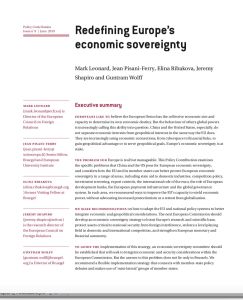加入 getAbstract 阅读摘要

加入 getAbstract 阅读摘要
Mark Leonard, Jean Pisani-Ferry, Elina Ribakova, Jeremy Shapiro and Guntram Wolff
Redefining Europe’s Economic Sovereignty
Bruegel, 2019
看看什么内容?
The EU’s economic sovereignty must expand to encompass geopolitical goals.
Recommendation
For the United States and China, economic might and national interests are one and the same. So, too, according to foreign policy and economic experts writing for the think tank Bruegel, must the European Union integrate political and economic objectives while continuing to embrace globalization and technology. Changing global power dynamics are forcing Europe to fend for itself, and EU member-states must act together to take a more assertive posture. Diplomats, executives and regulators will welcome this far-sighted analysis.
Summary
About the Authors
Mark Leonard leads the European Council on Foreign Relations, where Jeremy Shapiro is head of research. Guntram Wolff is the director of Breugel, where Jean Pisani-Ferry is a senior fellow and Elina Ribakova was a visiting fellow.























Comment on this summary